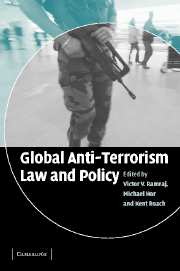Book contents
- Frontmatter
- Contents
- List of contributors
- Acknowledgements
- 1 Introduction
- PART ONE Theoretical Perspectives on Anti-Terrorism Law and Policy
- PART TWO A Comparative Study of Anti-Terrorism Measures
- PART THREE Anti-Terrorism Law and Policy in Asia
- PART FOUR Regional Cooperation
- PART FIVE Anti-Terrorism Law and Policy in the West
- PART SIX Anti-Terrorism Measures in Africa, the Middle East and Argentina
- 25 Terrorism and governance in South Africa and Eastern Africa
- 26 Rocks, hard places and human rights: anti-terrorism law and policy in Arab states
- 27 Terrorism in Argentina: government as its own worst enemy
- 28 Postscript: Some recent developments
- Index
27 - Terrorism in Argentina: government as its own worst enemy
Published online by Cambridge University Press: 21 July 2009
- Frontmatter
- Contents
- List of contributors
- Acknowledgements
- 1 Introduction
- PART ONE Theoretical Perspectives on Anti-Terrorism Law and Policy
- PART TWO A Comparative Study of Anti-Terrorism Measures
- PART THREE Anti-Terrorism Law and Policy in Asia
- PART FOUR Regional Cooperation
- PART FIVE Anti-Terrorism Law and Policy in the West
- PART SIX Anti-Terrorism Measures in Africa, the Middle East and Argentina
- 25 Terrorism and governance in South Africa and Eastern Africa
- 26 Rocks, hard places and human rights: anti-terrorism law and policy in Arab states
- 27 Terrorism in Argentina: government as its own worst enemy
- 28 Postscript: Some recent developments
- Index
Summary
Argentine society has experienced terrorism from domestic and external sources since the late 1960s. Domestic terrorism appeared mainly in the 1970s, first as leftist guerrilla movements that sought to attract attention when they failed to field an organized political movement. This small band of terrorists effectively paved the way for the appearance of brutal forms of state terrorism. The repressive state practices were first justified as a necessary antidote to the guerrilla activities, but quickly expanded into a blunt and massive campaign to eliminate any dissent to military rule. Unfortunately, the extra-legal methods employed by the Argentine government for fighting terrorist violence were mostly condoned or acquiesced in by the judiciary, and the legacy of the ‘Dirty War’ waged by the military junta continues to haunt the Argentine courts.
In more recent times international terrorism appeared. A massive attack destroyed the Embassy of Israel in Buenos Aires in 1992. In 1994, the building that harboured the two most prominent Jewish organizations in Argentina was targeted with another deadly bomb. In the combined attacks, conventional explosives caused in the aggregate about one hundred deaths and hundreds of injuries. In both cases criminal investigations have been ongoing for more than ten years, although there has been little success in bringing those responsible to justice. After one president was accused of interfering with the investigations of the bombings, a new president has promised to invigorate the investigation and to make its findings public.
- Type
- Chapter
- Information
- Global Anti-Terrorism Law and Policy , pp. 609 - 624Publisher: Cambridge University PressPrint publication year: 2005
- 2
- Cited by



